“Anyone who has the power to make you believe absurdities, has the power to make you commit atrocities”.
-Voltaire.
N. P. Upadhyaya (Aryal)
Kathmandu: We sincerely apologize for having missed last week in our regular column to mention about what the British Parliamentarians talked about the non-ending India’s Manipur ethnic violence that, as per the British Guardian daily dated 09 July, 2023 as follows:
“The spark for the unrest was a state court ruling on 27 March which gave the dominant Meitei Community “tribal status”, entitling them to the same economic benefits and quotas in government jobs and educations as the minority Kuki Community, as well as allowing Meiteis to purchase land, where the Kukis predominantly live. The decision was later stayed by the Supreme Court, which called it “factually wrong”.
Perhaps the Court’s decision too contributed to the flaring up of violence in Manipur since then.
The climax was the, let’s agree, “darkest day in Manipur-India’s history” was 04 May, 2023, when a few women folks were paraded in Manipur thoroughfares naked thus challenging and dishonoring the entire “Nari-Shakti” which literally means the “Women’s intrinsic power” resulting in the pouring in of worldwide condemnations on India and its shabby governance since the advent of highly uneducated Indian PM Modi.
Save Nepal-the ‘undeclared protectorate’, others spoke on Manipur violence.
The Manipur violence last but not the least approached Britain wherein the MP like Fiona Bruce took to task the BBC world news service for not reporting adequately the shocking happenings in Manipur that borders China. BBC is India biased.
Fiona Bruce is Britain’s special ambassador for religious Freedom and MP.

The INVC News dated July 22, 2023, reports Fiona Bruce as saying that “the attacks seem to be premeditated, with religious motivations exacerbating the tensions and violence. It has created an environment of fear and uncertainty among the people of Manipur”.
What is more than interesting and significant is that Fiona Bruce is said to be very close to sitting Prime Minister Rishi Sunak whom the Indians claim that he is the “lost brother in Kumbh Mela” and recently located in Britain as the country’s Prime Minister.
Fiona’s close association with PM Sunak does tell that Fiona must have taken note of Manipur violence only when she was told to raise the issue in the House.
The ongoing violence is so terrific and dreadful that many Nepali speaking Manipurians have begun sneaking into Nepal from the Eastern border that almost adjoins India’s troubled region of the North East and the Chicken Neck, reported the People’s Weekly on Sunday, July 29, 2023.
Similarly, Ms. Christina Lamb for The Sunday Times (Britain) dated July 29, 2023, presents almost an eye-witness report of the bizarre scene wherein two Manipurian women were paraded naked. She writes: “The video is almost impossible to watch. Two terrified Indian women stripped by a marauding mob of men with sticks, paraded and publicly groped before being dragged to a paddy field where they were allegedly gang raped”.
Leaving the country in political disorder especially in North East Manipur burning and boiling PM Narendra Modi, as stated earlier landed in the city of perfumes -Paris, France.
Fortunately, even in Paris a sizable section of the people and the media lashed out at PM Modi and accused host Macron that he had invited a bad and highly undemocratic character from India who had no democratic credentials.
Coinciding with Modi’s visit to France, a very influential French Daily, rightfully asserted that “the invitation to PM Modi is a slap in the face to the values of Human Rights and democracy that France claims to uphold”.
As if nothing have had happened in India, the Prime Minister Modi left for squeezing and embracing the French President Emanuel macron, who was himself in trouble up to the neck then with the violent riots across the country, and Modi brought back some highly sophisticated weaponries which surely awards edge over weak Pakistan and which in turn disturbs the regional peace and stability of South Asia.
The South Asian region is already threatened by India’s accumulation of arms and weapons from various Western countries.
The symptoms that India is swelled with armories and warlike materials got this week reflected the manner and the tone in which the sitting Defense Minister of India, July 26, 2023, Raj Nath Singh while addressing a tamed gathering of his military men in DRASS, Ladakh, sent open warning to rival Pakistan that, if need be and if provoked, “Ghar Mey Ghus Key Marengey”.
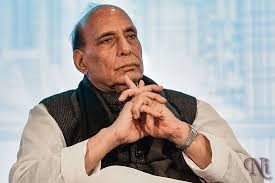
In the course of his speech in Ladakh , the chatty minister further said that “we can go to any extreme to maintain the honor and dignity of the country-if that includes crossing even the Line of Control (LoC)…we will cross the LoC”…
A Pakistan ruptured by the internal hotchpotch, alienated society, media standing apart on political lines, bitty intellectuals and the citizenry divided on favorite political taste and above all the countrymen to a greater extent suspecting the very intent of the all-powerful military as having deep and ingrained interest in national politics.
All put together, the military appears yet the most reliable institution that can daunt any threat emanating either from internal or external quarters like India obviously.
It is said that however a lion/tiger may appear outwardly weaker in its physique because of some temporary ailments, yet the ferocious animal (the King of the Jungles) will not chew grass.
Hardly had the Indian Minister Singh sent warning signals to Pakistan, the entire country came into action and the concerned ministry in Islamabad rebuked the Indian claim that if need be, LoC could be crossed.
The foreign office spokesman said, “Pakistan is fully capable of defending itself against any aggression”.
What was worth noting in the Pakistani rebuttal to India was the use of the word “counsel”.
Look where and how the word counsel has been used: “We counsel India to exercise utmost caution as its belligerent rhetoric is a threat to regional peace and stability and contributes to destabilizing the strategic environment in South Asia”.
The Pakistani statement was issued the very day India threatened Pakistan that is on July 26, 2023.
This does speak that Pakistan is clearly not a sinking horse yet.
International relations experts in Nepal term the Indian Minister’s threat to Pakistan as “election oriented”. Pakistan is the nearest target to attack at time of the elections.
The threat to Pakistan surely comes from the fresh forte of the Weapons that India has accumulated from the Western Countries as a prize for having entered into the QUAD security apparatus which is nothing, as is rumored, by a conglomerate of some four powerful countries that include, India, Japan, Australia and Japan.
Or else India is already a fractured State. Manipur is just an example.
Recent news in the air in South Asia is that some five Indian States in the North-East e.g. Tripura, Mizoram, Manipur, Meghalaya and Nagaland have exhibited their distaste in continuing with the Indian regime or say in others words, these NE States want their own independence and sovereignty to what they have had prior to the forced annexation in today’s India born 1947 August to be more specific.
Prior to 1947, the name India didn’t exist. It was the Britishers who at time of their grand departure from the vast South Asian landmass coined the territory wherein they ruled for at least two centuries as India.
That India existed in ancient times is a misnomer.
India more or less rules South Asia and that too at a time when its rival and presumed equally political and nuclear preventive force is in a disarray which are, we have been told, some of its own creations.
Politics is in a disorder since the very unceremonious ouster of former Prime Minister Imran Khan some two years ago on “readymade and concocted” charges.
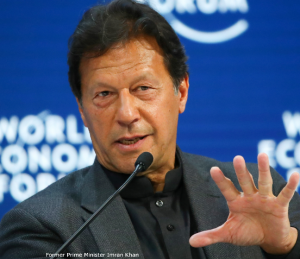
Since then India’s rival, once very logically taken as a recognized regional force that is competent enough to see eye to eye its rival India is inattentive in SA Politics.
However, the new set up though chaired by Prime Minister Shehbaz appears doing all he can to bring the derailed politics and economy in its original track, but, informed sources, say that things are not moving as per the Prime Minister’s Himalayan efforts.
Politics took a nasty turn in Pakistani history when deposed Prime Minister Imran Khan’s supporters reportedly attacked some key military installations and some top army top-hats have been timely purged for not being able to protect the key military infrastructure.
The IMF deal that was signed recently by the Islamabad authorities must have given some breather to the cash strapped nation and hope that the realm shall restore its former political and economic stamina and emerge as a refurbished State.
Interestingly, much ahead of the mayhem of the much-publicized May 09, 2023 sad event that took Pakistan by surprise, the sitting Army Chief Syed Asim Munir had landed in Beijing as back as in April this year to bolster its ties defense with China in the changed context.
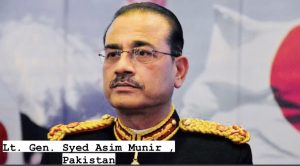
Anadolu Agency (AA) sources say, dated April 27, 2023, that Pakistani and Chinese military commanders during the trip to Beijing discussed regional security and bilateral military cooperation, emphasizing the importance of maintaining peace and stability in the region.
It was the time when Indian PM Modi was planning a trip to the USA and later to France.
This does mean that Pakistan was well abreast of the Indian moves and acting accordingly which then again means that “China shall not abandon Pakistan in any eventuality” and the bonds in between the two is unshakeable come what may.
Amazingly, China did not utter a single word even after the arrest of PM IK as, speculations were rife, for the Chinese establishment, what counts is the Military institution.
China has no interest in an elected government in Pakistan but instead its visible leaning is on the Army.
In Beijing, Army Chief Syed Asim Munir reportedly met not only with the top military brass but also met with the Polit Bureau member and top diplomat Wang Yi on April 27, 2023.
Wang Yi is reported to have lauded the efforts of the Pak Army in defending the country from onslaughts.
“Mr. Wang hinted to Syed Munir that in China’s strategic calculation the Pak Army, rather than civilian elected governments, can be better relied upon by Beijing to ensure stability”.
This means that the Pak Army Chief returned all agog with when he got positive signals from Pakistan’s ironclad brother.
And very freshly, the Global Village Space, July 29, 2023, published a news that must have some meaning underneath.
The news is that the Chinese vice Premier He Lifeng has arrived close on the heels of the IMF deal with Pakistan that has allowed some breathing space to cash strapped Pakistan.
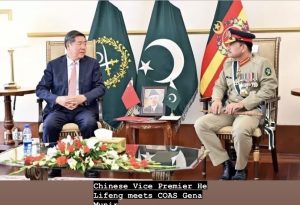
The Vice Premier He Lifeng during his short stay in Pakistan had heavy high-level engagements and dialogues with the highest Pakistani authorities.
He met also with Army Chief Syed Asim Munir.
An event was organised in Islamabad over the completion of 10 years of CPEC project titled ‘From vision to reality’ in which Prime Minister Shehbaz Sharif and Chinese Vice PM He Lifeng participated as the special guests.
The CPEC was formally launched in Pakistan on July 5, 2013, with an investment of over $25 billion and He Lifeng came to attend the completion of a decade of the CPEC-taken as game changer for Pakistan economically.
The China-Pakistan political bond is increasing over these years. Imran Khan’s ouster has nothing to do with China-Pakistan relations.
China is in Pakistan much the same way as the US is in India.
This too has far reaching political meaning.
Could this then be said that the China-Pakistan increased hobnob after Imran’s arrest tentatively equals what the US means to India in the Quad?
Albeit, China-Pakistan ties are not knotted to any security mechanism such as Quad.
Yet the China-Pak increased juxtaposition appears to be guided by a purpose and that being the, hopefully, upkeep of the South Asian regional peace and stability.
If the US prefers to shield India then why should not Pakistan be shielded by China and that too for regional stability?
It is here that brings China and the US into confrontation sadly. The US and China must reconcile ultimately for the larger interest of the global peace.
Needless to say, after the advent of President Xi, China appears more than interested in its increased engagement with South Asian nations and that way it prefers to influence South Asian geo-politics.
China’s increased bilateral ties in South Asia strategically appears steered by a desire in containing Indian power (after the entry into the QUAD mainly) and resisting the expanding American influence of late.
For all this to happen, China necessarily needs to strengthen India’s rival-Pakistan’s strategic and military capabilities.
Besides Pakistan, China has considerable clout in B’desh, Bhutan, Sri Lanka.
(Excerpt from a Central European Journal of International and Security Studies) Vol. 12, 2018).
In Nepal, China is in a fix as it is trying hard to unite the Communists who are indoctrinated by the Indian regime knowing even that these fake Nepal Communists were working for India and are taken now in Nepal as “Gold Smugglers”.
Needless to say, China’s interest in South Asia is certainly aimed at increasing its political and security interests.
The more India and the Western nation’s center eye on South Asia, China too will act accordingly by positioning itself in South Asian nations particularly in Pakistan, Bangladesh, Sri Lanka and even Bhutan.
Of late Beijing-Thimpu have met in Kunming as regards the border issue which is why Indian FS B. M. Quatra landed in Thimpu recently.
Nepal is a lost case for China as reiterated earlier, Nepal’s Communists speak India, eat India, dream India, sleep India, talk India and even excrete India.
Yet China believes Kathmandu is important in South Asia. Nepal PM Dahal is leaving for China shortly. However, much ahead of PM Dahal’s China visit, Indian Foreign Minister S. Shankar is landing Kathmandu to twist the ears of his posted men in Kathmandu politics.

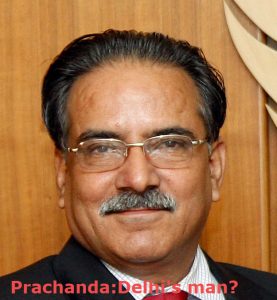
PM Dahal stayed more than a decade in New Delhi, China must recall.
Instead it should strengthen Pakistan to blunt Indian hegemony in South Asia and also to keep the region peaceful and safe.
So aptly reiterates Dr. Pushpa R. Adhikari in his article titled China in South Asia published by World Affairs: The Journal of International Issues, Vol. 18, No 2, that “in keeping with the goal of “National Dream” in mind and for security considerations, it has been creating and strengthening bonds with Pakistan, Afghanistan, B’desh, Nepal and Sri Lanka, which increase its leverage on India.
Putting all these political reasons together, which China-Pakistan Economic Corridor (CPEC), both Pakistan and China have had envisioned that the full completion of the CPEC will not only help-build Pakistan economy but will qualitatively enhance the social, political, economic prowess of Pakistan which of late is in trouble.
CPEC is a game changer so both China and Pakistan believe.
This perhaps fittingly explains why China and Pakistan need each other in South Asia and beyond.
If and when Russia too joins or for that matter enters South Asia through Pakistan (as a suitable alternative to India now aligned with the Quad) only then the trilateral alliance of Islamabad-Beijing- Moscow shall be able to act like a political, economic and “nuclear preventive” in South Asia given the visible superiority of India due to the excessive flow of weaponries from the Western nations meant for India. Notably, Russia too apparently is not happy with India’s inching closer to the QUAD. And with the US also which is lingering the Ukrainian high voltage conflict. And above all, Russia and China at the moment are on the same wavelength on global political issues.
That’s all.
